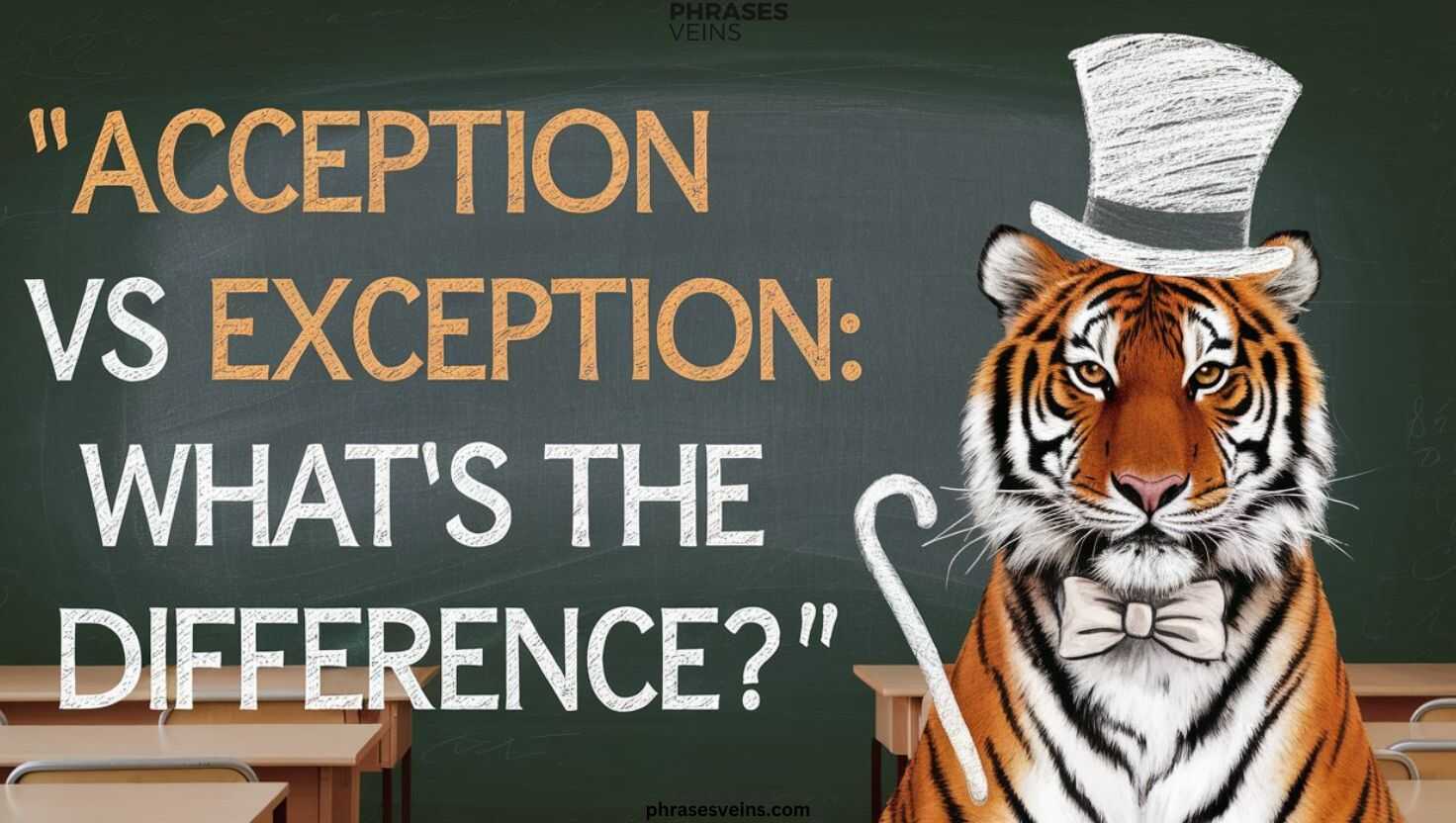Have you ever wondered about the difference between acception vs exception? These two words sound quite similar, and many people get confused when using them. While they share some similarities, they have different meanings and uses. Let’s take a closer look at the difference between acception and exception, how they are used, and why this confusion exists.
Acception vs Exception
At first glance, acception vs exception might seem like a simple issue of spelling. But in reality, it’s more about understanding their meanings and usage in the English language. Many people mistakenly swap these words, not realizing that acception is a rare and often obsolete term, while exception is still widely used in modern English.
Key Distinction:
The difference between acception and exception is simple once you know their definitions. Acception is an outdated word that historically meant acceptance or admission, but it’s hardly used anymore. On the other hand, exception is still common, referring to something that deviates from a rule or generalization.
Acception: Definition and Usage
The word acception comes from an older form of English, where it referred to the action of accepting something. In modern language, this term has become largely obsolete and isn’t commonly used in everyday speech or writing.
Acception Meaning:
- Acception means acceptance, especially in contexts like accepting a rule or proposal.
- It’s rarely used today, as acceptance is the more commonly chosen term.
Synonyms for Acception:
- Acceptance
- Admittance
- Acknowledgment
Examples of Acception
While acception is outdated, it might still appear in old literature or formal legal contexts. Here are some examples to help clarify its use:
- “The acception of his invitation was a pleasant surprise.”
- “In the acception of the law, there were no exceptions.”
These examples might sound strange to modern ears. Instead, we’d typically use acceptance today.
Exception: Definition and Usage
The word exception is far more common in English today. It refers to something or someone that doesn’t follow a rule or generalization. We often use exception when we want to highlight that something is different or stands out.
Exception Meaning:
- An exception refers to something that deviates from the norm.
- It is used in many contexts, such as law, rules, and everyday conversations.
Synonyms for Exception:
- Anomaly
- Outlier
- Deviation
- Exemption
READ MORE >>> “Acclimate” vs “Acclimatize” vs “Acclimatise”: Which Verb You Use
Examples of Exception
Exception is commonly used in a wide variety of contexts. Here are some practical examples to help you understand how this word is used:
- “Everyone must follow the rules, with the exception of those with special permissions.”
- “There is always an exception to every rule.”
These sentences are easy to understand, and exception is used in everyday language around the world.
Difference Between Acception and Exception
Now that we’ve looked at each word’s definition and usage, it’s time to summarize the key difference between acception and exception:
| Term | Meaning | Modern Usage |
|---|---|---|
| Acception | Acceptance or the act of accepting something. | Rarely used today. |
| Exception | A person or thing that does not follow a rule or norm. | Commonly used. |
Why the Confusion?
The reason people get confused between acception and exception lies in their phonetic similarities. They sound very much alike, especially in fast speech, leading to phonetic mistakes.
Additionally, because acception was used in older forms of formal language, people may not realize it’s now largely obsolete. This is why the word has faded from regular usage.
Countries’ Usage of Acception and Exception
The usage of acception vs exception may vary depending on where you are. In most English-speaking countries like the USA, Canada, and the UK, exception is the preferred term.
In some old literature or historical legal documents, you might still find acception, but it’s becoming rare. Exception is globally understood and used in formal and informal language, making it the clearer choice.
Key Insight
Understanding the key distinction between acception and exception can help you avoid errors in your writing. It’s important to choose the right word based on its meaning and context.
- Acception refers to an old form of acceptance, while exception refers to an anomaly or deviation from a rule.
- Exception is common and widely used, while acception is considered rare and obsolete.
Countries’ Usage of Acception and Exception
The words acception and exception are used differently across various countries, with exception being the dominant term in modern English, especially in the United States, the United Kingdom, Canada, and Australia. Acception, on the other hand, is extremely rare today, mostly found in old literary works or historical texts. Most speakers of English today would only use exception in their daily conversations, while acception is almost obsolete in standard English.
Acception
Acception was once used to mean acceptance or the act of accepting. However, it has fallen out of common usage. In some older texts, it appears in contexts where acceptance would now be used. Today, acception is found primarily in historical or academic discussions of language, and it is not used in contemporary speech or writing.
Acception Meaning in Hindi
The meaning of acception in Hindi can be translated as स्वीकृति (swīkṛti), which means acceptance. However, because this term is rarely used, स्वीकृति is more commonly associated with acceptance rather than acception.
Exception
Exception, on the other hand, is a widely used term across all English-speaking countries. It refers to something that is excluded from a general rule or pattern. For instance, “Everyone must follow the rules, with the exception of those who are exempt due to special circumstances.” This usage is prevalent in everyday speech, academic writing, and legal contexts.
Exception Meaning in Hindi
The meaning of exception in Hindi is अपवाद (apvād), which refers to something that is different from the norm or an anomaly. This term is used frequently when describing rules or situations that do not apply in every case.
Which Is Used the Most?
Exception is by far the most widely used term across the globe. It has become standard in modern English, while acception is virtually obsolete. The use of exception is common in everyday speech, formal writing, legal language, and academic contexts. In contrast, acception has almost completely disappeared from contemporary English, with very few instances of it appearing in modern texts. Therefore, exception is the word you will encounter most frequently in all English-speaking countries.
What is Acception?
Simply put, acception is an outdated word that once meant acceptance or admission. It was used in more formal contexts but has been replaced by more modern terms like acceptance or acknowledgment.
If you encounter the word acception in historical or legal texts, it’s important to understand that it no longer holds much relevance in everyday language. The word you likely need is acceptance.
Frequently Asked Questions
1. What is the difference between acception and exception?
The difference between acception and exception lies in their meanings and usage. Acception is an outdated and rarely used word, which means acceptance or the act of accepting something. It’s no longer commonly used in modern English. On the other hand, exception is widely used and refers to something or someone that deviates from a general rule or pattern. For example, “Everyone must follow the rules, with the exception of those with special permission.”
2. Is it no acception or no exception?
The correct phrase is “no exception”. This means that there is nothing that breaks or deviates from a rule. For example: “There will be no exception to this rule,” meaning everyone must follow it without any exceptions. “No acception” would not be correct because acception is an obsolete word and is rarely used.
3. What does make an acception mean?
The phrase “make an acception” is incorrect and outdated. Historically, acception meant acceptance, but this word is no longer used in modern English. The correct phrase would be “make an exception”, which means to allow something that would normally be excluded or not permitted. For example, “I will make an exception and let you borrow the book today.”
4. What is the difference between accept and exception?
Accept is a verb that means to receive or agree to something. For example: “I accept your invitation.”
Exception, on the other hand, is a noun that refers to something that does not follow a rule or pattern. For example: “This is the exception to the rule.”
5. What do you mean by exception?
An exception refers to something or someone that does not follow the usual rule, norm, or expectation. It’s used to describe an anomaly, deviation, or exclusion. For example, “She is the exception to the usual working hours,” meaning she works different hours than everyone else
Conclusion
The difference between acception and exception comes down to their meanings and usage. Exception is the clear winner in modern English, used in many contexts to describe deviations from rules. Acception, however, is a rare word that has largely disappeared from modern usage.
Next time you’re deciding between acception and exception, remember that exception is the more practical choice, used globally and understood by all. By avoiding this confusion, you’ll write with more clarity and confidence.

Welcome to PhrasesVeins, where Arabella Reed brings language to life. With a passion for grammar and phrases, Arabella offers unique insights to help you master language and enhance your expression. Whether you’re a language enthusiast or looking to improve your skills, Arabella’s work guides you through the beauty of words.

